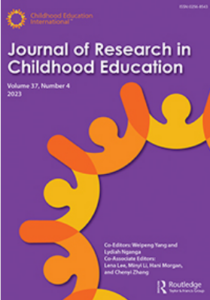Journal of Research in Childhood Education
 This academic journal presents education research on a wide range of ideas, including theory articles and studies on all scales. From empirical research projects to small-case studies carried out in naturalistic settings, such as schools and community centers, the Journal of Research in Childhood Education articles track data across cultures and study research design. Published 4 times a year, JRCE keeps teacher educators informed about best practices for advancing education and learning.
This academic journal presents education research on a wide range of ideas, including theory articles and studies on all scales. From empirical research projects to small-case studies carried out in naturalistic settings, such as schools and community centers, the Journal of Research in Childhood Education articles track data across cultures and study research design. Published 4 times a year, JRCE keeps teacher educators informed about best practices for advancing education and learning.
Table of Contents
Volume 39, Issue 4
Parental Psychological Control and Children’s Curiosity and Academic Self-Concept
Gendering Emotions Work in Primary Schools: “Effortless” or “Important”?
Teaching Emotional Self-Regulation Skills to Young Children With Challenging Behavior
Physical Activities in Hong Kong Kindergartens: Grade-Level Differences and Venue Utilization
Gamifying Learning with AI: A Pathway to 21st-Century Skills
Table of Contents
Volume 39, Issue 2
Theme Issue – Meeting the Needs of Indigenous, Marginalized, and Minoritized Children Globally: Innovative Pathways to Sustainable Futures
Free access through September 30, 2025
The Early Childhood Education in India and Traces of Colonial Regimes: A Critical Discourse Analysis
Early Childhood Education in Pastoralist Regions of Kenya
Leadership for Sustaining Cultural Identities: Pacific Ways of Knowing, Being, and Doing in ECE
Navigating Borders: Transnational Latine Students’ Use of Border Thinking Pedagogy Practices
Educators Co-Constructing Religiously Responsive Pedagogies With Muslim Children and Families
Table of Contents • Special Issue (Open Access)
Volume 38, Issue 1 Supplement
Parent Training and Child Development at Low Cost? Evidence From a Randomized Field Experiment in Mexico
by Sergio Cárdenas, David K. Evans, and Peter Holland
This article presents evidence on the effects of a low-cost, group-based ECE program in rural communities in six Mexican states.
Read the article
The Virtual Irie Homes Toolbox: Adaptation and Remote Delivery of an Early Childhood, Violence Prevention, Parenting Program in Jamaica
by Taja Francis, Lelys Dinarte-Diaz, Shawn Powers, and Helen Baker-Henningham
This article examines the impact of a 10-week program focused on early childhood, violence prevention, and parenting in Jamaica.
Read the article
Impact of COVID-19 on Young Children and Families in Jamaica
by Maureen Samms-Vaughan, Sydonnie Pellington, and Rosan Reynolds-Salmon
This article outlines impacts of the COVID-19 pandemic on young children and families in Jamaica. Some key findings include financial difficulties, reduced access to education, increased parenting demands, and increased levels of corporal punishment.
Read the article
Pre-Primary Education and School Readiness Amid the COVID-19 Pandemic: Evidence From Ethiopia
by Janice Kim, Mesele Araya, Pauline Rose, and Tassew Woldehanna
This article investigates the impact of the COVID-19 pandemic on pre-primary-age children’s school readiness in Ethiopia.
Read the article
Parental Engagement in Children’s Pre-Primary Education in Marginalized Communities in Tanzania Before and During the COVID-19 Era
by Richard Shukia and Stansilaus Marobo
This study examined parental engagement in their children’s pre-primary education in socioeconomically deprived settings in Tanzania. Finding the potential for greater learning loss during the pandemic among children in this group, it points to the importance of additional support for these parents and children.
Read the article
Using Early Childhood Data and Measurement to Leverage Change: Are We Making Progress?
by Abbie Raikes
As countries make investments in early childhood care and education systems, data and measurement play a critical role in outlining strengths and areas for improvement. This article focuses on the role of measurement in ECCE and key issues facing ECCE data and measurement.
Read the article
Parental/Caregiver Engagement in Early Learning Systems: Findings from Early Learning Partnership (ELP) COVID-19 Research in Pakistan and Ethiopia
by Monazza Aslam, Saba Saeed, Belay Hagos, and Baela Jamil
This study explores the degree of engagement of parents/caregivers of preschool children in Ethiopia and Pakistan and the modes of learning they used for home learning during COVID-19 school closures.
Read the article
Pashe Achhi: A Low-Tech Model of Learning and Psychosocial Support for Children and Caregivers
by Mohammad Safayet Khan, Erum Mariam, Nasrin Akter Akhi, Esrat Jahan, and Sakila Yesmin
Pashe Achhi is a telecommunication model that emerged out of the COVID-19 pandemic in Bangladesh to provide support for children ages 0-5 and their caregivers through mobile-to-mobile calls. This article examined the impact of the intervention.
Read the article
Understanding Access to and Learning Outcomes from ECE Among Refugees and Non-Refugee Populations in Uganda: A Cross-Cohort Comparison
by Bea Simpson, Mary Goretti Nakabugo, and Ricardo Sabates
In Uganda, access to early childhood education is limited for children from disadvantaged families, particularly refugees. This article examines the level of access to and learning outcomes from ECE among refugees in Uganda over time.
Read the article
Ten Years of Early Childhood Education (ECE) in Punjab (Pakistan): What Have We Learned?
by Amna Ansari, Tazeen Fasih, and Ella Humphry
This article explores early childhood education administration across two accountability relationships in Pakistan’s most populous province, Punjab. The results indicate a need to strengthen the province’s early learning system and improve the flow of accountability through effective delegation, finance, information, and motivation.
Read the article
Donor Coordination and Evidence Uptake in Early Childhood Education Policy
by Rachel Hinton, Holly Scott, Shawn Powers, and Salim Salamah
Although there has been a recent increase in investment in ECE, the share of official development assistance for ECE remains extremely low. This article provides considerations for researchers, practitioners, and policymakers interested in increasing donor finance for ECE.
Read the article
Childhood Education International is a consulting services organization that helps schools, organizations, and government ministries to develop and enhance their early childhood development services. We focus on early childhood education and the holistic supports that are essential for children’s health and wellbeing.
